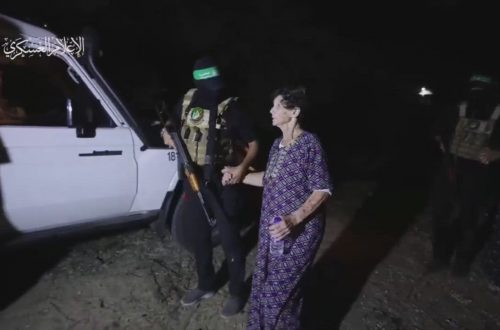There seems to be a significant new tone emerging from the leader page of the Guardian in the past week:
On Thursday, after Blair’s press conference, there was this leader which, while it obviously contains points one could take issue with, struck a few people I talked to as something of a departure.
The point here is not to pretend that any of these issues – from the Iraq war to asylum seeking – is irrelevant to understanding the attacks that Britain now faces. Each of them is part of the story. But the larger point is that the bombings are part of a more complex set of factors that are not susceptible to simple solutions. US troop withdrawals from Iraq – which even Donald Rumsfeld appeared to be promoting yesterday – would not bring an end to suicide bombing. But nor would the Mail’s daft idea yesterday that we would all sleep safely in our beds if only Britain were to withdraw from the European convention on human rights.
Mr Blair articulates a better awareness than most of the big picture, as well as of the complexity and interconnectedness of things. But he too has his big blind spots – Iraq and the rule of law among them. He was given a good lesson on the importance of the latter in his wife’s admirable lecture on the role of judiciary yesterday. But until he, and we, can all better come to terms with the lessons of July 7 – that there are people in our midst who are trying to kill us and much larger numbers who approve and rationalise their wicked deeds – then we will waste too much time fighting old battles and may struggle to win this new one.
It is high time the debate about 7/7 moved on from point-scoring about the Iraq war and, coming the day after the press spent their time with the PM trying to trap him into conceding an Iraq ‘link’, the Guardian leader struck me as an attempt to draw a line under that particular cul de sac. Whatever one’s view of the rights or wrongs of the invasion, or indeed its impact on Jihadist recruitment, the notion that a withdrawal from Iraq (with all the potentially calamitous consequences that would carry) would remove the terrorist threat is a fantasy.
Then today’s (Saturday) leader looked on the mood in the country and the kind of collective response needed to defeat the enemy.
On the opinion pages Stopper lawyer Louise Christian says: Politicians tell the public who travel on public transport to remain calm and carry on normal life. Yet the response from politicians and police to terrorist attacks in London is one of panic and hysteria. Already one innocent man has been shot dead. Armed police roam the streets, and innocent people are being arrested and searched at gunpoint.
I’m sure we have all read quite a lot of alarmist comment in the past week but the Guardian leader gets it right:
It is not difficult to depict events of the kind that London has suffered during July 2005 as evidence of a society that is close to the edge. The carnage from the bombs on the buses and tubes has been terrible enough, but these attacks are the epicentres from which multiple other dangers and tensions ripple out across the city and the country. There is now residual stress and fear in every journey on public transport. A young Asian with a rucksack sets off alarm systems, justifiably or not. Police have never been more present across the city, visible in numbers on the streets and watching unobserved via networks of cameras.
Every day the news is dominated in some way by the emergency; all else is drowned out. Sometimes it seems as though the ties that bind have frayed beyond repair and we have been transported into a much bleaker and lawless kind of society. A week ago an innocent man’s life was snuffed out by a police shooter but Scotland Yard confirmed this week that they have almost opened fire seven other times. On some 250 occasions police have thought they might be dealing with a suicide bomber. Whatever the pretext for this terror, it is hard for life to continue under pressure of such dangers and the callous hatred that lies behind it.
And yet, amazingly, consistently and cheeringly, life does go on, and it does so with an equilibrium and momentum that may seem hard to credit when set against the backcloth of such events and pressures and when people submit to the temptation to treat this as an apocalyptic time. Much was written after the first attacks about the resilience of Londoners in the face of the bombs. Some of it was sentimental and some of it may have been premature. But the general determination of the city to try to go on living together according to its written and unwritten rules has been palpable this month.
If London truly was a city on the brink, then the killing of Jean Charles de Menezes might have ruptured the trust that holds things together. Instead, people seem to have decided that the police can make a dreadful mistake and yet still be worthy of support at the same time. A week after the innocent Brazilian was killed, an immense collective effort to identify and capture the real criminals appeared to have harvested spectacular success last night. This could not have happened if the police were not good at their job – no wonder their ratings have rocketed. But that in turn could not have happened without public support and, in particular, support from the very communities whose trust in our institutions was supposedly most in doubt. None of it would have been possible if the police had not planted seeds of trust long before the first bombers arrived at King’s Cross on the morning of July 7.
I can’t comment on the mood in London as I haven’t been in the city since the attacks but, having just spent three weeks in East Lancashire, in towns with large Muslim populations and racial tensions, towns that I am sure were and still are close to the top of the police’s ‘backlash watchlist’, I was struck by the normality of the atmosphere.
The Guardian comment concludes:
This is not in any way to brush aside the disturbing lessons of the Stockwell shooting. On the contrary. The lesson of July 2005 is that the honest and remorseless way of doing things pays bigger dividends and will win in the end. Quick fixes, whether in the form of volleys of bullets to the head or reflexive promises of tough new laws, are not the best proof of our collective implacability, even though each may have its place in extreme circumstances.
The public understands this better than the politicians may think. During the IRA killing campaigns of the 1970s, republicans and their apologists persuaded themselves that the longer the bombings went on, the more likely they were to achieve their goals. They failed to understand that, while the public was not particularly bothered about the politics of Ireland, they were also determined not to give into the bombers. In the end, the IRA gave up bombing because it got them nowhere. In the end the same thing will happen with the reactionary jihadists. This is a strong and resilient society, not one that is about to collapse in panic.
That is an optimistic take on the situation but nonetheless (in a piece entitled ‘Will to Win’) a welcome one. The strategists behind the terror will surely be assessing the reaction of British society to the atrocities, looking for signs of weakness to exploit and play upon. The country’s political leadership have been clear that they will “not give an inch”, mainstream Muslims have been appalled by the attack, condemned it and, in many cases, been willing to discuss ways of taking on and defeating the dangerous reactionaries within their communities.
In the world of polemics on the internet and in newspaper comments pages the debates over ‘root causes’ and the nature of Islamism have raged and while television and radio debates amplify the voices of appeasement – in the streets and the pubs my experience has been that those voices are marginal. For most people the reaction to 7/7 has been one of quiet defiance.
The public may not be particularly bothered about the politics of the Middle East or the ideology of Islamism but they are determined not to give into the bombers.
And it is good to see the Guardian reflect that.


